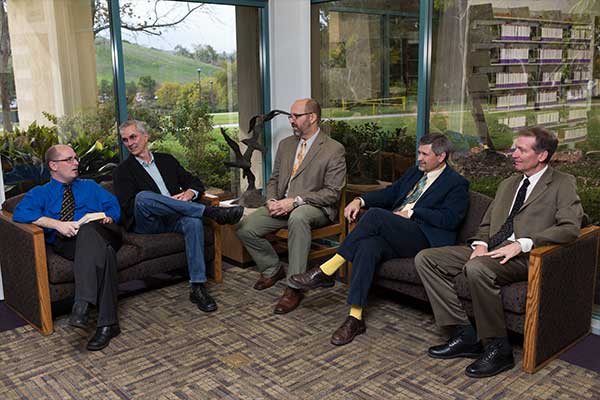CJ Armstrong, assistant professor of history and an ordained pastor in the LCMS, feels like the new kid on the block compared to the scholars around him. Armstrong’s commentary on several of the general epistles (James, 1 and 2 Peter, 1, 2 and 3 John and Jude) for the RHBC series came out last fall and Armstrong credits “his fantastic church and people who listen to me in Bible class” for helping shape the work, as well as his fellow scholars at Christ College.
“Here at Concordia I have great colleagues who are willing to listen to my ideas,” Arm- strong says. “They are brilliant, experts in their fields, scholars second to none. They are faithful to a Lutheran hermeneutic, looking at things faithfully through the lens of Jesus Christ as the center of Scriptures. To have colleagues who continue to keep the faith is important.”

Most of Armstrong’s writing was done at a busy Orange County coffee shop with “terrible coffee and terrible service but outdoor seating, a wonderful patio and great character.” The white noise helped him to focus, he says: “If I see the world around me—the car wash going off in the back, the music piped through—there’s something psychological about that. I can really pound that through.”
Scott Ashmon, assistant professor of Old Testament and Hebrew, is the opposite. While writing his scholarly work on birth annunciations in the Bible—that is, the foretelling of births such Jesus’, John the Baptist’s and Isaac’s—he found music, noise and even beautiful scenery so distracting that he turned his desk to face a blank white wall and wrote for six hours at a stretch.
“That’s just how I had to operate,” he says.
His book Birth Annunciations in the Hebrew Bible and Ancient Near East (Edwin Mellen Press, 2012) has been reviewed in top scholarly journals and is in several research libraries such as Oxford, Cambridge, Harvard and Princeton. Ashmon says,
I’m interested ultimately in how it helps the church.”
“That’s part of the reason I chose this topic rather than, say, gold mining in the ancient world. This is ultimately Christo-centric. Hopefully it’s going to be helpful to pastors.”
Ashmon chipped away at the book over seven years, mostly on Saturday mornings in his office. He was recently asked to con- sider writing the Malachi commentary for the CCS series, to sit alongside Middendorf’s Romans commentaries.
“It’s daunting,” Ashmon says. “To approach Malachi isn’t just to approach the book of Malachi but the prophetic corpus, and to know all the scholarship about that... Of course it will employ scholarship but I’m not really writing this for the scholarship at Yale. I’m writing for pastors and interested laypeople, and of course it will be good for scholars, too. But I want to help with the proclamation of the full word of God for the church and the sake of the gospel... The academy is a servant of the gospel. What we examine in the academy is important, but not ultimately important. What’s ultimately important is Christ and his gospel. I like being at a place where we take the best of that scholarship and help clarify, explain and proclaim God’s word.”